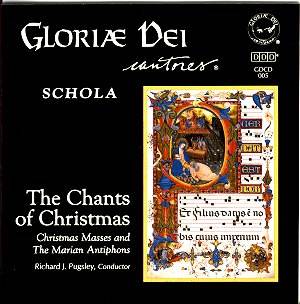This disc contains the Propers of the Masses
for Christmas Day along with 8 Antiphons to the Blessed Virgin
Mary; 28 items in all on a disc lasting over 72 minutes. It is
quite tricky holding such programme of short items together with
nothing to bind them. I did wonder whether performing fewer items,
but binding them together with the Ordinary of the Mass would
have made for more coherent programming. I feel that punctuation
supplied by performing the Ordinary along with the Propers is
the most satisfactory way of presenting this Chant, and this is
something that Gloriae Dei Cantores have done on other discs.
The CD booklet informs us that 'The foundation
of their interpretation in this recording is three-fold: the rhythmic
marks of the Laon MS (Biblothèque minucipale, 239) according
to the studies of Dom Eugène Cardine; the implications
of modality; and the corporate experience of using the chant for
daily worship since 1976'. Regrettably they do not expand on this
rather gnomic statement, which leaves the average listener unenlightened
about what, if any, differences there are between the singing
of the Schola and contemporary practice in performing chant. (In
fact Dom Eugène Cardine and the Solemes school have emphasised
the natural word rhythm as the basis for chant rather than purely
metrical approach) This is the only real musical substance in
the booklet; it does not provide any information about the musical
background to the chant. The booklet includes texts and translations
for all the chant, but what background there is, is a religious
one. This is very admirable, but surely the booklet's editors
should have considered their wider audience. It is fascinating
to know that the Christmas Day Feast is the only Feast in the
Church calendar with 4 masses (Vigil, Night, Dawn and Daytime)
and that the current Feast arose out of the celebrations after
the Council of Ephasus in 432. But couldn't we have been given
some information about how this, musically, affects the chants
that are sung. As far as the style of singing the plainchant goes,
it is done pretty much in the way that I was taught and there
are no real surprises.
The choir sing the Propers for the four Christmas
Masses (Missam in Vigilia, Missam in Nocte, Missam in Aurora,
Missam in Die). These are followed by they Marian Antiphons, 'Alma
redemptoris mater', 'Ave regina coelorum', 'Regina coeli', 'Salve
regina'. Each of these is given twice, using Simple Tones and
Solemn Tones.
Gloriae Dei Cantores are a Massachusetts based
choir numbering around 40, with female Altos. They are a church
based, non-professional choir, singing weekly services. The Gloriae
Dei Cantores Schola is a 16-person group dedicated to singing
Gregorian Chant. They have been singing plainchant regularly since
1976, both the daily Benedictine Monastic Offices and the Ordinary
and Proper of the Mass. They sing in an admirably flexible manner
with beautiful diction.
But, just how unanimous should chant be, especially
on a recording? Here, both the men and the women exhibit small
lapses in unanimity which cause the line to lack the firmness
it needs. In performance this would not matter. But here, on a
recording, every lapse is noticeable. Speeds are generally on
the brisk side. This is quite admirable and stops the chant becoming
ponderous, but does lead to a little untidiness. Attack is generally
on the firm side and sometimes I found myself wishing for something
a little more gentle and spiritual, especially from the men's
voices. The lovely little Introit for the Missam in Nocte, 'Dominus
dixit ad me' with its rather tender rocking motion, is here given
a rather robust performance that seems to miss the point.
But in the end, we come back to the format of
the disc. By the last track, no matter how admirably sung, I would
have liked a little variety. Surely we would have appreciated
the Propers more if fewer of them had been recorded and they had
been offset by parts of the Ordinary of the Mass and some chanted
Lessons. After all, this is how this music is supposed to be appreciated.
After listening to this recording you rather feel like you have
eaten too many truffles, a surfeit of good things.
Robert Hugill

